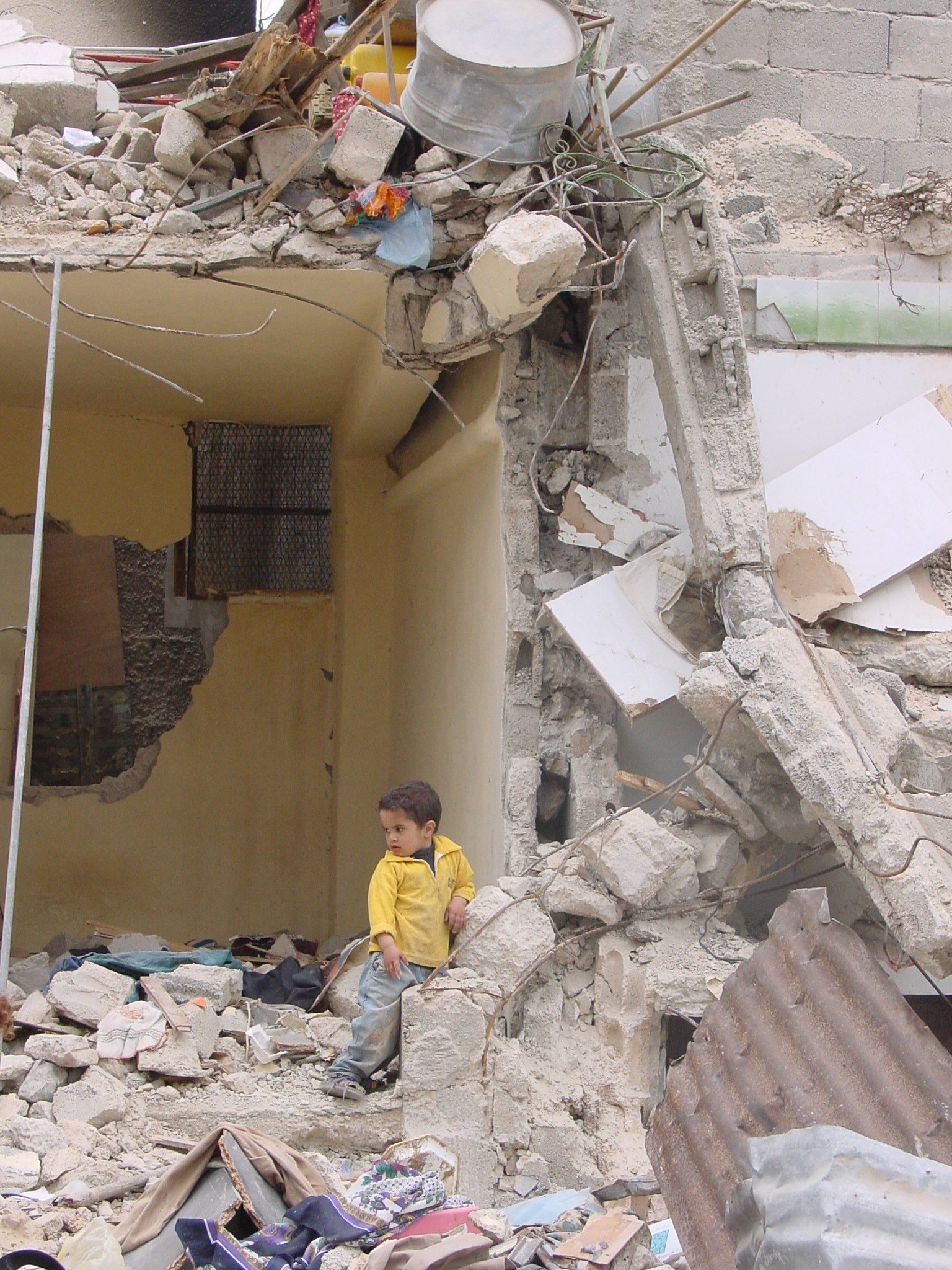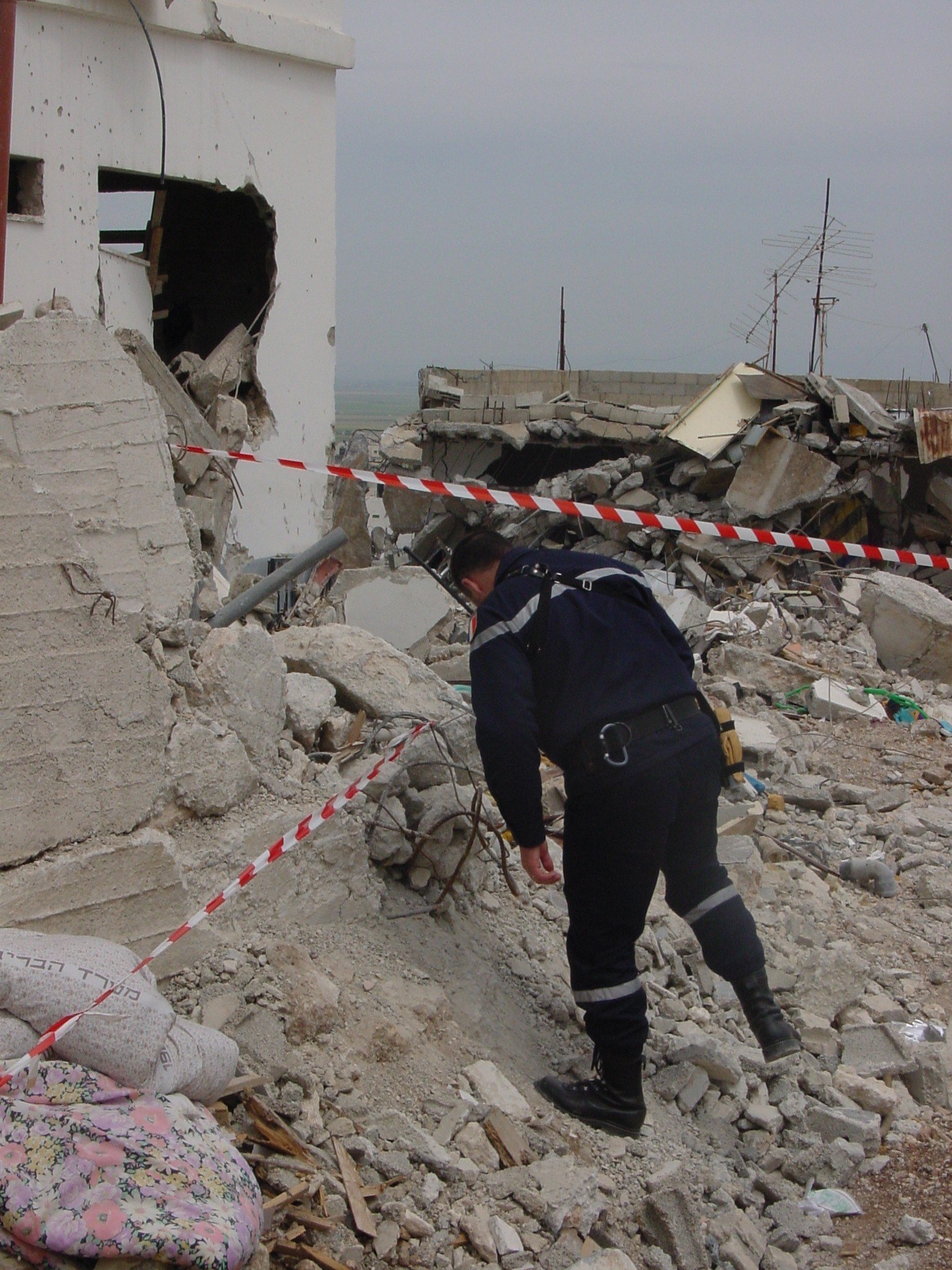April 26, 2002
We both joined with the students from the University in their volunteer work at Jenin Camp. There wasn't as much to do as there had been over the previous few days, maybe because it was Friday. Elizabeth joined a couple students and went off looking for needy journalists. After a couple spins around the camp and no nibbles on the line, they returned to the UNRWA girls' school (the staging area for most NGOs and our designated meeting spot).
There, they got notice that a translator was needed by a journalist with Time magazine. Elizabeth and a student headed off to help him interview a political leader in the camp. They saw his home, which was not obliterated in "Ground Zero," but rather blasted and burned by missiles from a helicopter attack. He wasn't there at the time. When he and his family went to prayer at the mosque, they (Elizabeth, student, journalist, and journalist's fixer) stayed and discussed violent and non-violent resistance to occupation, especially comparing India and Palestine.
A Palestinian child amidst the rubble of Jenin Camp.
When our host returned, they had lunch (a generous spread of bread, chicken and kebab) with him and his family - humbling to be fed by people without a home. As the meal ended, someone from Bill Moyers' PBS show "Now" came to do an interview as well. One question she asked was why Palestinians had refused the goods sent to the camp from the US. He responded that the helicopters, tanks, missiles, and bullets that destroyed Jenin Camp were from America - how could people be expected to forget that and accept gifts? If America didn't want this disaster, then it should have prevented it. Additionally, many of the goods offered by America were made in Israel. Like salt in a wound.
After the interview, they followed the team around as they moved through the camp, ending at the UNRWA school again. It was rather heady to be around such big-time journalists, and Elizabeth wishes she could say she helped them a bit, but the truth is that her Arabic is still not that good, and the AAUJ student translated for them expertly.
French firefighters have come to volunteer their assistance, identifying potential explosives amidst the rubble.
Meanwhile, Marthame headed off with a couple of students to scout out. For a while, they worked with a group of French firemen who had come to help identify undetonated explosives (a few are set off each day as people scrape through the rubble - both Israeli and Palestinian booby traps) and identify which buildings were too unstable for people to stay in. It's hard to imagine that any of these buildings could be safe for habitation.
A young girl climbs amidst the rubble.
They also joined up with a couple of Greek journalists who were doing a story on the destruction in the Camp. The stories that they heard ran along these lines: the area that is now known as "Ground Zero Jenin" was initially covered by a green tarp by local community leaders in order to prevent air surveillance from aiding the Israeli invasion. Fire bombs dropped from Cobra helicopters soon took care of that cover, as well as beginning some of the initial destruction. It is suspected that a collaborator was somehow signaling the Israeli air force which homes to target (we heard both by some kind of laser pointer and also by some kind of marking powder). When he was discovered by leaders of the Camp, rather than carry out their revenge, they made him do the same to one of the houses in which the Israeli army had set up base. This is where the thirteen soldiers were killed. This differs widely from the Israeli army's story, that they entered a booby-trapped house. Neither is far from what is possible in this place.
All that remains standing at “Ground Zero” in Jenin Camp.
Marthame's group also accompanied a Japanese photojournalist who is working on a book. He is interviewing fifty 18 year-old Israelis and fifty 18 year-old Palestinians to help the Japanese public understand the conflict. Searching the Camp for an 18 year-old girl proved difficult, it turned out. Many families have relocated, seeking shelter where they can - in Jenin itself, with families in other parts of the Camp, in nearby villages like Rummane and Burqin. You slowly begin to notice how few men are around, especially young men. It is mostly women and young children sifting through the remains of their homes. Many others have been arrested, many are presumed dead.
There was, in parts of the Camp, the unmistakeable stench of death. Elsewhere, it's simply raw sewage that permeates the air. Back in Zababdeh, the unwelcome sound of gunfire has returned to the Israeli military training camp. Heck of a lullaby.




